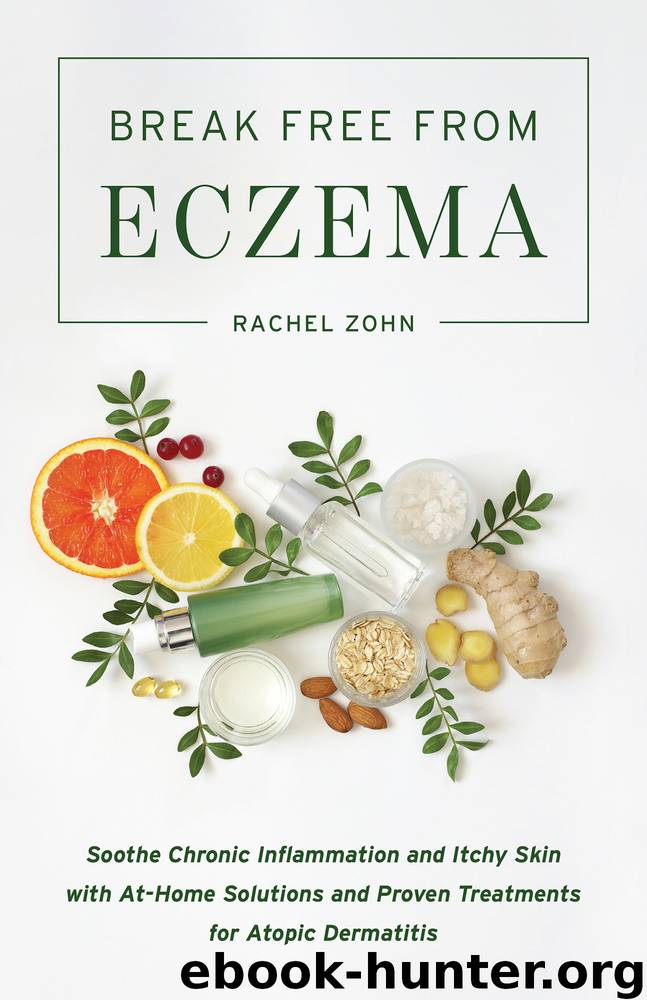Break Free from Eczema by Rachel Zohn

Author:Rachel Zohn
Language: eng
Format: epub
Publisher: Ulysses Press
Published: 2020-06-25T16:00:00+00:00
CARING FOR YOUR SKIN THE NATURAL WAY
Pretty packaging and fancy brands don’t necessarily add up to more effective skin care. Sometimes natural products can include surprising and hidden benefits, without the concerns of using harmful chemicals. However, you should do a patch test before using a new product, especially if you’re prone to reactions or have sensitive skin.
One simple way to do a patch test is to apply a small amount of product to the inside of your wrist or to the side of your neck, because these areas have thinner, more delicate skin. Cover the area with a bandage and wait 24 hours to see if you have a reaction. If you have any questions, consult your health-care provider.
This chapter looks in depth at a number of natural topicals that are believed to help with eczema and examines some of the research behind their effectiveness.
Coconut Oil—This natural emollient has long been considered a safe way to soften and soothe the skin. Coconut oil can help reduce irritation and itching, and researchers have found that it has a number of other health benefits, Lio notes. Coconut oil is rich in lauric acid, a fatty acid that randomized controlled trials have found can decrease staph colonization by 95 percent in patients with eczema. A 2018 study found that coconut oil has anti-inflammatory properties, and a 2014 scientific review found that it can effectively reduce the presence of bacteria, viruses, and fungi.
However, some people with eczema report that coconut oil isn’t moisturizing enough for their skin, or that they are prone to react to it, so be sure to patch test it first.
Sunflower Seed Oil—This oil is rich in linoleic acid, a fatty acid that is believed to play a role in maintaining the skin barrier and decreasing the amount of water we lose from our skin. Maintaining the skin’s natural moisture is crucial to managing eczema.
The evidence shows that sunflower seed oil has at least a modest effect on chronic eczema, notes Lio. One study showed that children with moderate eczema who used a cream containing sunflower seed oil, along with a topical corticosteroid, had decreased leathery patches of skin and less skin damage from itching and scratching. They also ended up using less corticosteroids and reported an improved quality of life.
Topical Vitamin B12—Also known as cobalamin, this topical vitamin is considered to be a compelling addition to the natural arsenal against eczema, Lio explains. Some studies have found that applying vitamin B12 to the skin decreases eczema symptoms by reducing the production of nitric oxide, which has been linked to triggering itch in people with chronic eczema.
At least two randomized controlled trials have found that applying cream containing vitamin B12 has been effective in helping to reduce multiple symptoms of eczema.
Honey—Natural healers have long recognized honey’s healing powers; for centuries they have been using the sticky bee-made substance as a natural antibacterial and anti-inflammatory agent to heal wounds. It’s believed that manuka honey in particular possesses wound-healing properties. Manuka honey is made by bees that collect the pollen from the manuka tree, also known as the tea tree.
Download
This site does not store any files on its server. We only index and link to content provided by other sites. Please contact the content providers to delete copyright contents if any and email us, we'll remove relevant links or contents immediately.
When Breath Becomes Air by Paul Kalanithi(7264)
Why We Sleep: Unlocking the Power of Sleep and Dreams by Matthew Walker(5642)
Paper Towns by Green John(4169)
The Immortal Life of Henrietta Lacks by Rebecca Skloot(3826)
The Sports Rules Book by Human Kinetics(3588)
Dynamic Alignment Through Imagery by Eric Franklin(3489)
ACSM's Complete Guide to Fitness & Health by ACSM(3469)
Kaplan MCAT Organic Chemistry Review: Created for MCAT 2015 (Kaplan Test Prep) by Kaplan(3423)
Introduction to Kinesiology by Shirl J. Hoffman(3301)
Livewired by David Eagleman(3122)
The River of Consciousness by Oliver Sacks(2992)
Alchemy and Alchemists by C. J. S. Thompson(2911)
The Death of the Heart by Elizabeth Bowen(2901)
Descartes' Error by Antonio Damasio(2731)
Bad Pharma by Ben Goldacre(2730)
Kaplan MCAT Behavioral Sciences Review: Created for MCAT 2015 (Kaplan Test Prep) by Kaplan(2492)
The Gene: An Intimate History by Siddhartha Mukherjee(2491)
The Fate of Rome: Climate, Disease, and the End of an Empire (The Princeton History of the Ancient World) by Kyle Harper(2436)
The Emperor of All Maladies: A Biography of Cancer by Siddhartha Mukherjee(2431)
